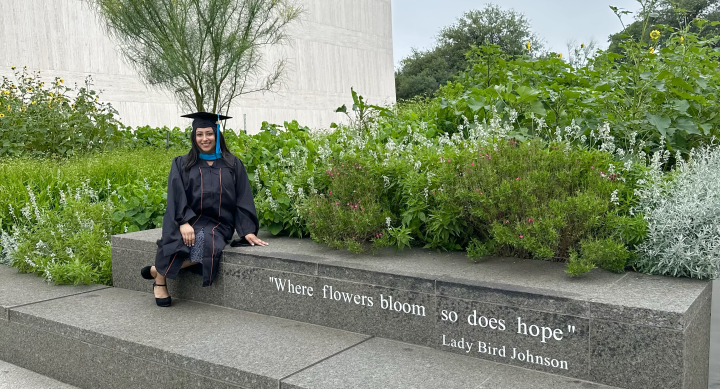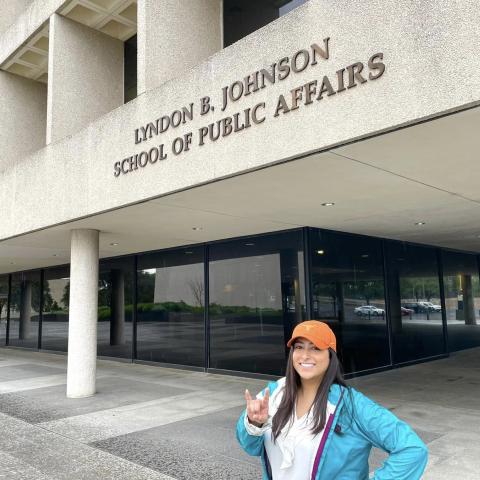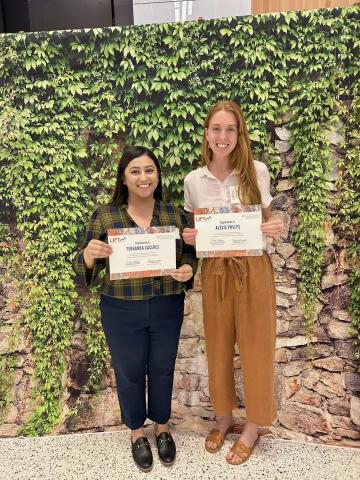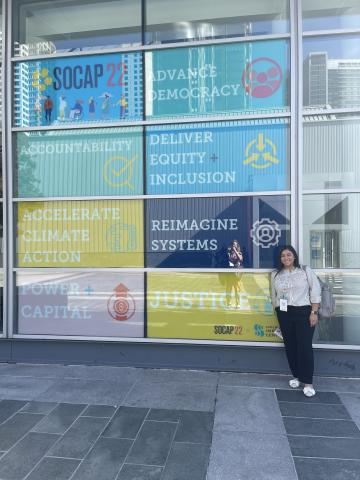
Fernanda Cáceres, a 2023 graduate of the LBJ School’s Master of Global Policy Studies (MGPS) program and RGK’s Nonprofit Portfolio program, is applying lessons she learned in graduate school to her work in food and water systems at The Nature Conservancy, a global environmental nonprofit.

Global change-makers face the challenge of working across borders, Cáceres said, often engaging with different governments, multinational companies, and communities while having to balance the priorities of diverse stakeholders.
“When it comes to our shared environmental goals and challenges, there's no borders around that,” Cáceres said. “Water flows through borders, air flows through.”
Cáceres is a corporate engagement associate at the conservancy, where she’s focused on helping companies in the agrifood sector “to protect and be better stewards of the natural resources their businesses depend on,” she said.
“It's about looking at the bigger picture,” Cáceres said. “That's definitely one of the things that the LBJ School really taught me: How do we look at the entire system and how do different players feed into that problem you’re seeking to address?”
Cáceres graduated from The George Washington University in 2018 with a bachelor’s degree in international affairs. She later joined the Urban Institute, a social and economic policy think tank, as a development associate.
“That job, and being exposed to experts on all sorts of different policy issues, from housing taxation, education, you name it, it was sort of like a mini university, and I was just fascinated,” Cáceres said.

While she enjoyed working in domestic policy, Cáceres’ interest shifted toward global approaches to social impact. She started looking at graduate programs where she could learn more about how companies are supporting solutions that are “good for people, good for nature, and good for society in general,” she said.
After encouragement from a handful of UT and LBJ School alumni at the Urban Institute, Cáceres applied to the LBJ School’s MGPS program, and started classes on the Forty Acres in the fall of 2021.
During her first year, Cáceres was a graduate intern at TechnoServe, an international organization focused on alleviating poverty through market-based solutions. Cáceres’ work focused primarily on supporting smallholder coffee farmers in Peru.
She continued learning about food systems through her yearlong policy research project (PRP) instructed by professor Rajeev Patel, Ph.D. Cáceres and her classmates worked with the International Panel of Sustainable Foods Systems, collecting and synthesizing data around food action plans by the Glasgow Food and Climate Declaration. In addition to developing a survey from scratch and writing a final report, this project required continuous learning about the state of the global food system.
“I knew I was starting to get a little bit more into our food systems and understanding issues around agriculture, and so I liked the ability to design my own specialty within the MGPS program,” Cáceres said.

A highlight of Cáceres’ experience in the RGK Center’s Nonprofit Studies Portfolio program was the mentor she gained in professor Meeta Kothare, Ph.D. Cáceres took Kothare’s class on impact investing, and then had the opportunity to attend the SOCAP conference in San Francisco, California.
“Dr. Kothare provided a lot of guidance, and the RGK Center facilitated funding for me to attend,” Cáceres said. “At SOCAP, I had the opportunity to learn more about the impact investing community and, in particular, how fundamental it is to embrace innovative financing solutions to tackle our most complex social and environmental challenges."
Cáceres also participated in LIFT, a program managed by Kothare that matches students with corporations and nonprofits to address sustainability challenges.
“I was matched up with an agroindustrial company called Grupo Pantaleon, based in Guatemala,” she said. "As a grad student, being able to do this type of sustainability consulting project with a real client was a very unique opportunity.”
One of the biggest misconceptions about the MGPS program, Cáceres said, is that it’s only for those who want to work in public service roles. "Many of my peers, myself included, ended up in different career paths in the private and nonprofit sectors,” she said. For prospective MGPS students, Cáceres emphasized the importance of leaning into your interests and building your own path in policy and social impact studies.
“There's so many ways that you can tailor your interests and explore a variety of topics,” Cáceres said. “You can look at food systems, and it has to do with public health issues. It has to do with the environment, food security, national security, international business and supply chains. There's so many different (policy) entry points, and I think that can be said too about other topics of interest.”
Learn more about our Master of Global Policy Studies. Applications close May 15.

